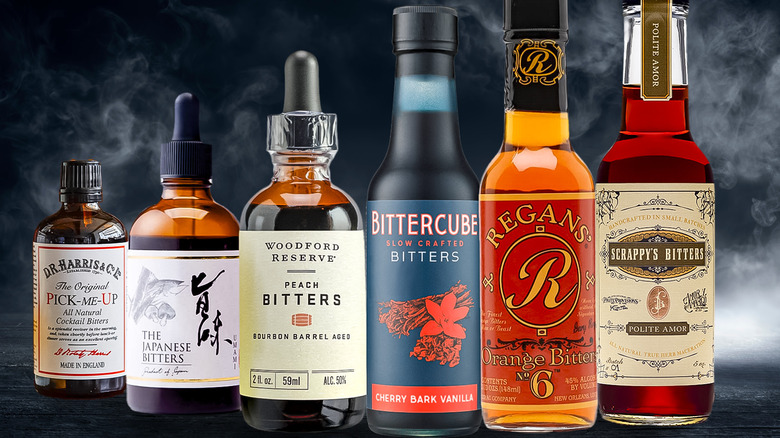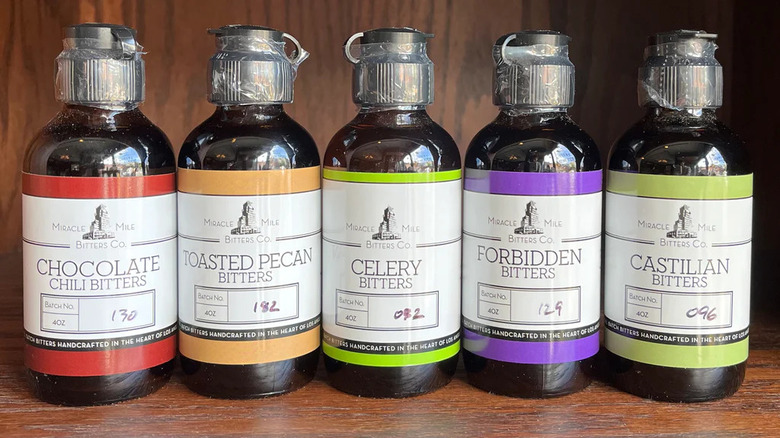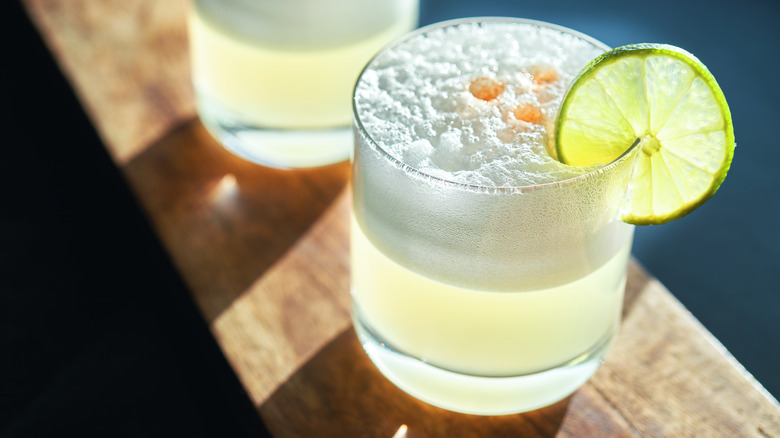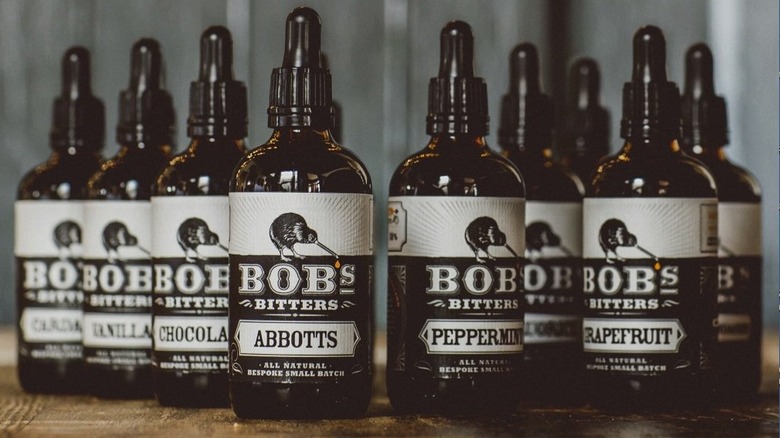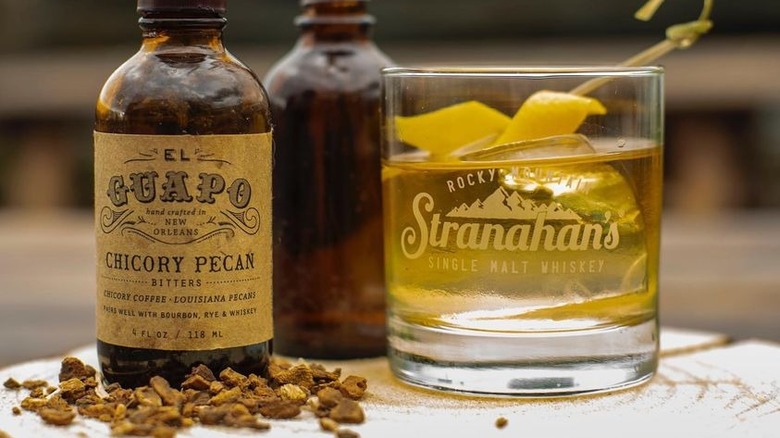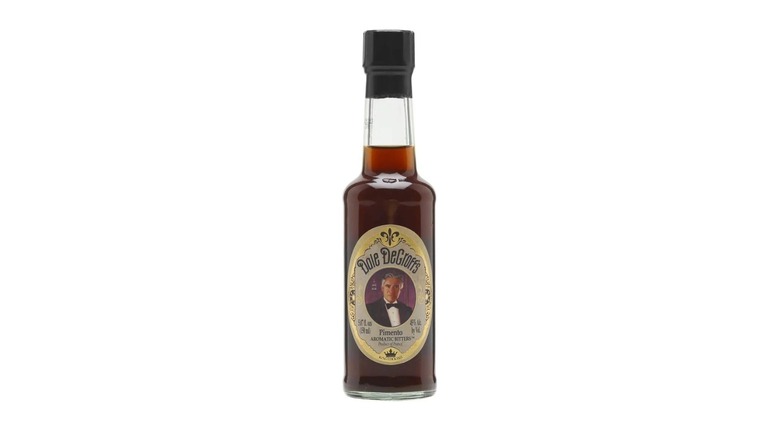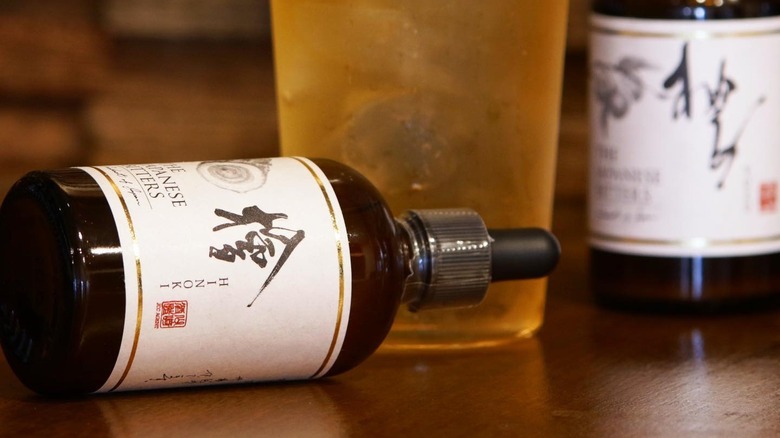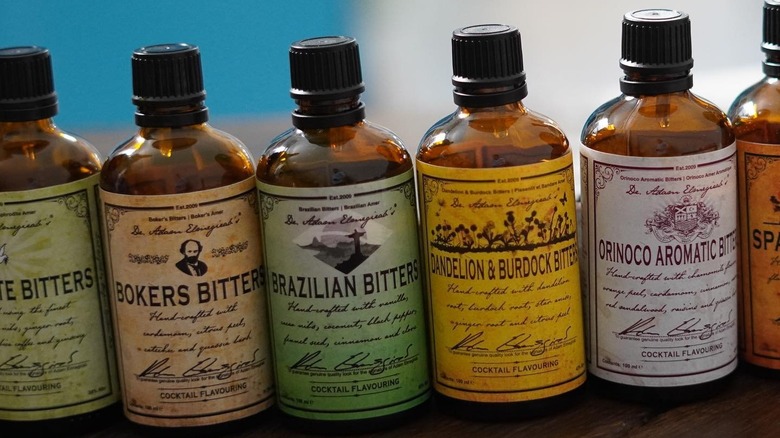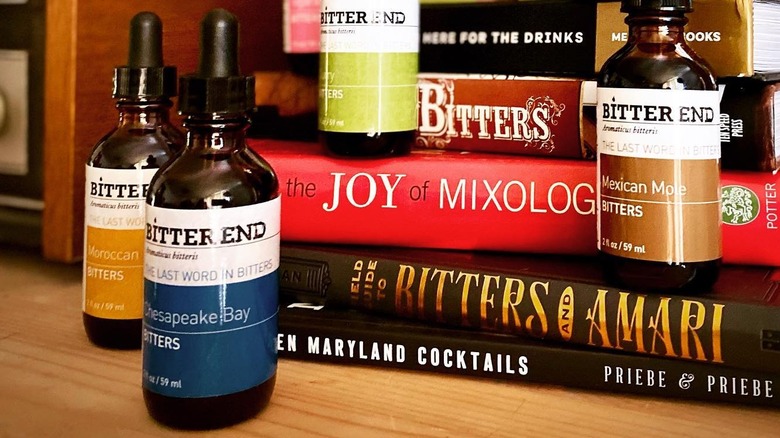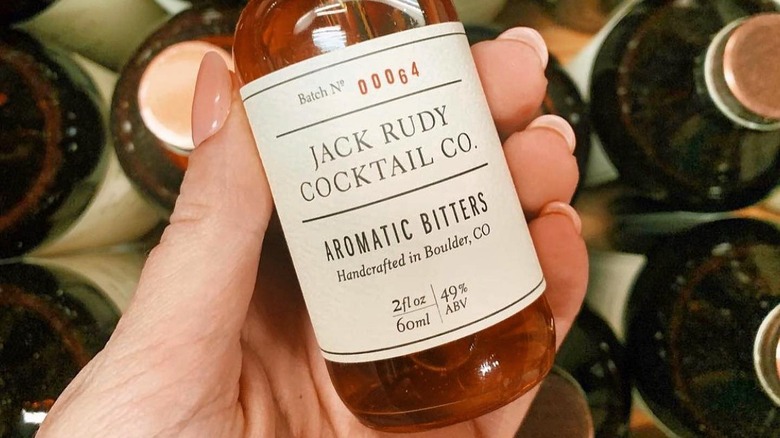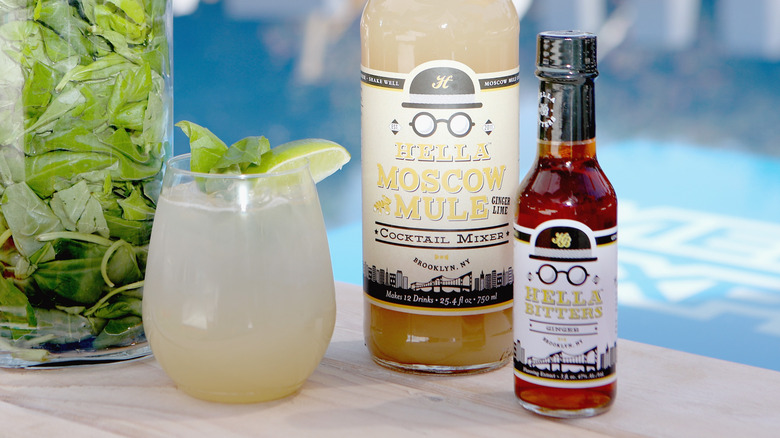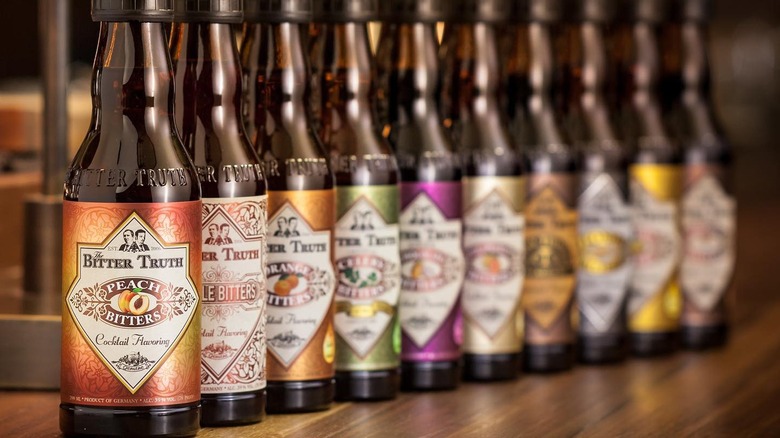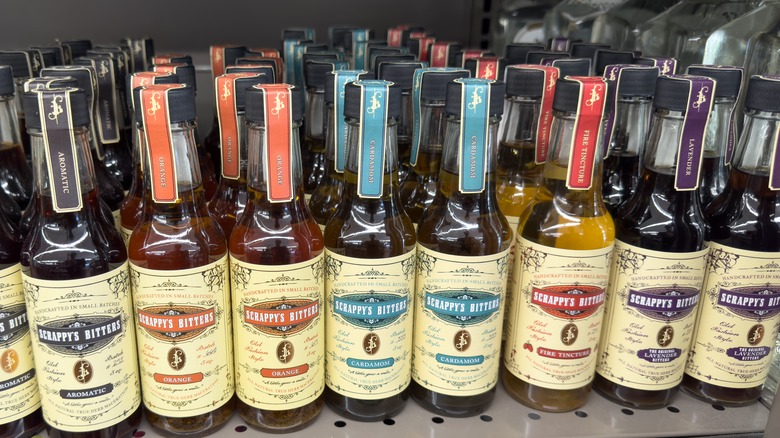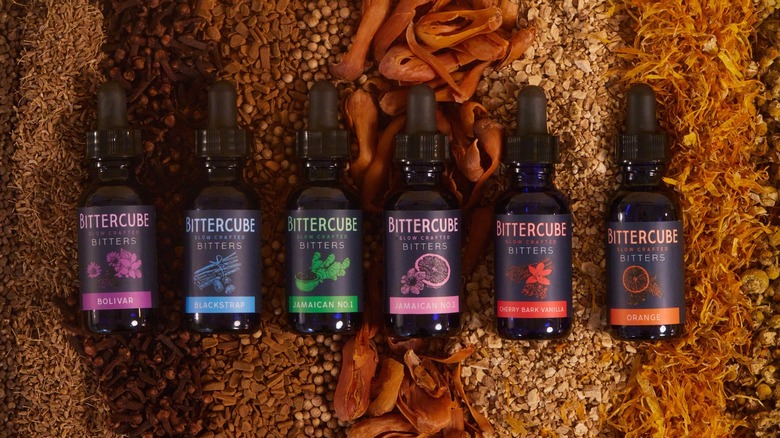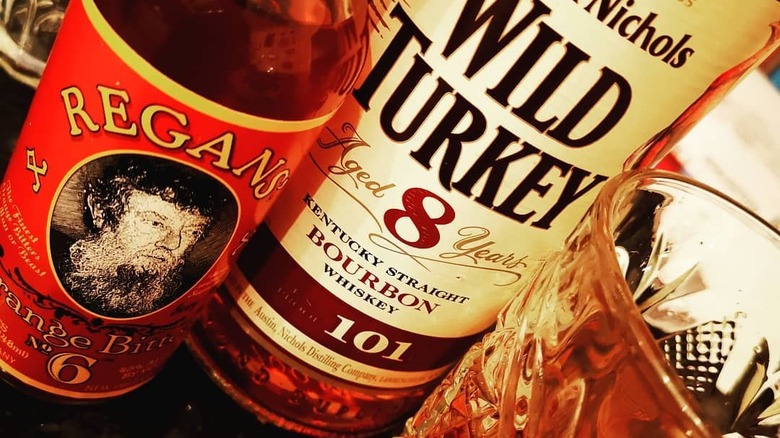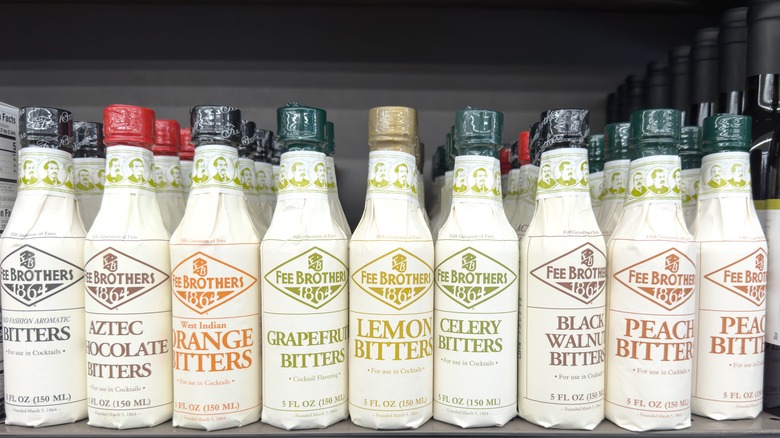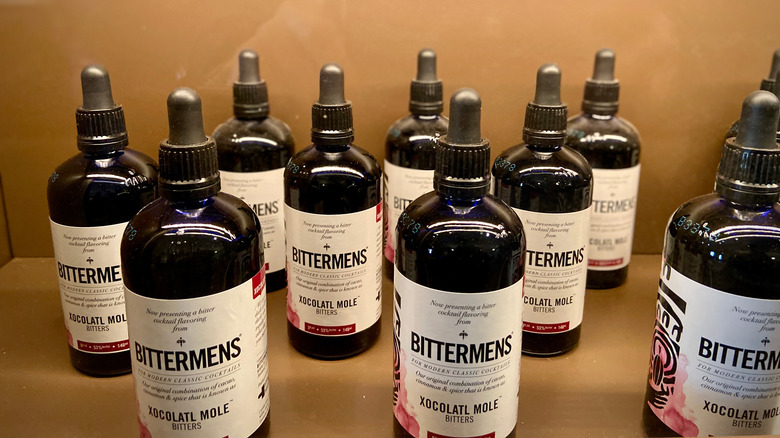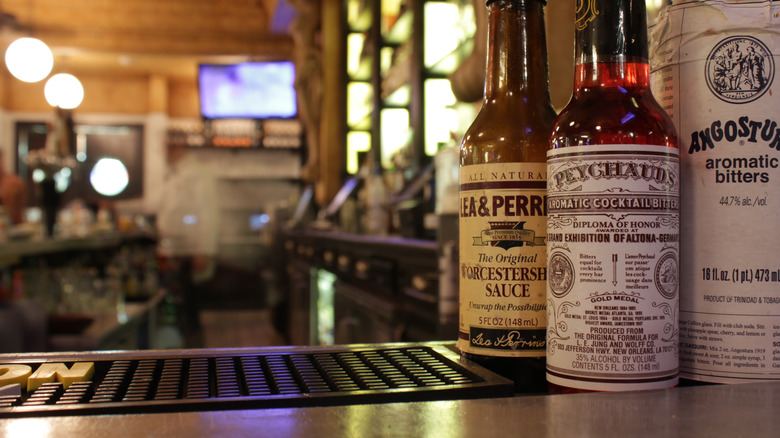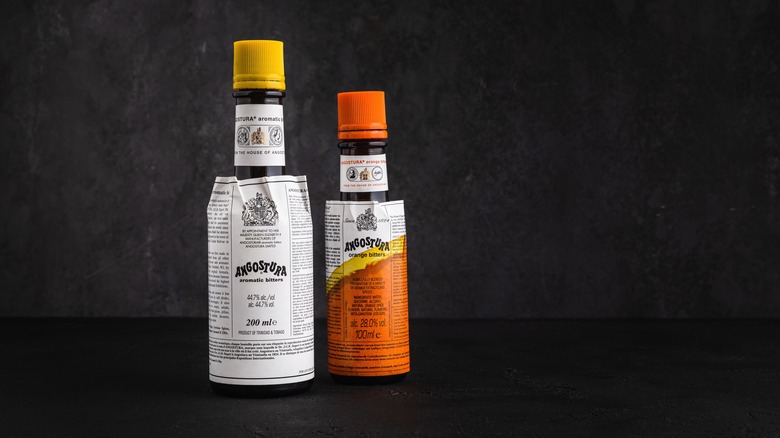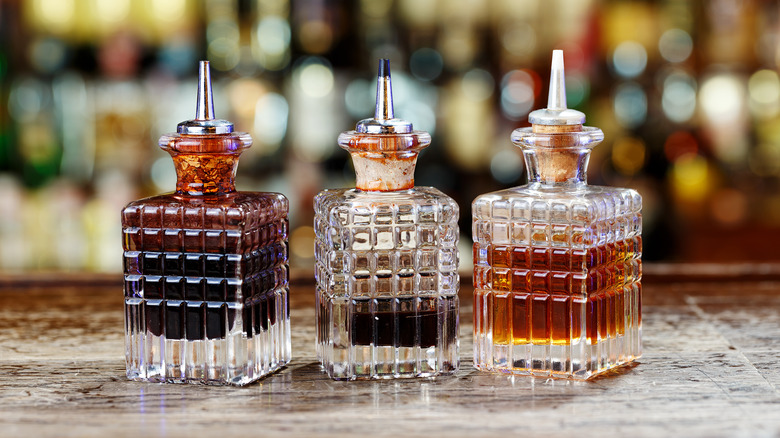20 Cocktail Bitters Brands, Ranked By An International Bartender
Originally sold as a medicinal tincture in the 19th century, bitters are often one of the most overlooked cocktail ingredients. As an experienced bar manager and cocktail bartender, I can tell you that just a few drops of the right one have the power to completely transform a drink from something ordinary into a truly special tipple.
Bitters are a relatively simple concept, consisting of botanicals, herbs, and roots infused into a neutral grain spirit, but eventually, early mixologists realized the impact they could have on cocktails, using them in classics like old fashioneds, Manhattans, and Sazeracs to name a few. Nowadays, there are countless varieties of bitters on the market, making use of a wide selection of ingredients — some inspired by old-school components, others using more contemporary ingredients.
Some bitters manufacturers are famous for a specific concoction that's become ubiquitous thanks to its versatility or association with a particular cocktail, whereas others are known for their creativity and unique ranges. To make it easier to sift through the countless bitters brands and up your cocktail game, I've ranked my favorites below. More on the methodology is at the end of the article.
20. Woodford Reserve Bitters
Woodford Reserve is best known for its versatile, mid-range bourbon whiskey that works just as well as a sipper as it does in cocktails. The brand is also known for its long-standing sponsorship of the Kentucky Derby. To complement bourbon-based cocktails like old fashioneds, Woodford Reserve created its own range of bitters consisting of classic Aromatic, Orange, Chocolate, Spiced Cherry, Peach, and Sassafras & Sorghum.
Overall, the selection isn't bad and a few of the varieties like Aromatic and Spiced Cherry can add an interesting twist to whiskey cocktails. These bitters fail to make it higher up the rankings due to the fact that ultimately, there are other brands that simply handle each of the flavors better.
19. Miracle Mile Bitters Co.
Hailing from Los Angeles, California, Miracle Mile Bitters Co. is the baby of bitters aficionado Louis Anderman who decided to start making his own as a passion project in 2010. It's fair to say that while not every one of Anderman's experiments has been a resounding success — some flavors such as the yuzu or pecan can get easily overwhelmed by stronger tasting ingredients — he's managed to knock it out of the park with others.
Specifically, the Miracle Mile Castilian Bitters stand out as a perfect addition to tequila and mezcal-based cocktails thanks to a dandelion root and licorice-forward flavor profile. Alternatively, if you're looking for a robust tincture to put a pep in your step, the brand's finely tuned Red Eye Bitters is washed with bacon fat that gives a savory weightiness to drinks and is infused with espresso coffee for a caffeine kick.
18. Amargo Chuncho
Named for the indigenous Amazonian Chuncho tribe, who famously resisted the colonization attempts of Spanish Conquistadors during the 16th century, Amargo Chuncho is a brand known for a single product and is synonymous with a single cocktail.
Peru's national drink is the renowned pisco sour, and any cocktail purist will tell you that the drink isn't complete with a few dashes of Amargo bitters. This particular bitters blend is a balanced yet complex union of over thirty botanicals sourced from the Amazon. The country's famous bitters have an aromatic, tropical flavor akin to a banana or plantain. Unfortunately, Amargo is rarely used in drinks other than the Pisco Sour, so unless you're prepared to get creative at home, you might find yourself stuck with the bottle for a while.
17. Bob's Bitters
Created by Bob Petriel, a British ex-pastry chef from London, Bob's Bitters was initially a custom project at the request of the revered bar manager of The Dorchester, Guiliano Morandin. After a surprisingly successful reception in the local bar scene, Petriel decided to launch a small batch range of bitters, utilizing a secret production process and closely-guarded recipes.
Bob's core range consists of 11 different flavors, but interestingly it's the ones closest to his pastry chef background (vanilla and chocolate) that stand out the most. He's also responsible for the arguably impressive recreation of Abbott's bitters, a classic American cocktail ingredient from the early 20th century with no surviving recipe.
16. El Guapo
Born out of New Orleans, El Guapo's bitters range regularly pays homage to the brand's culinary Louisiana roots, frequently hitting the mark. The brand's selections include some classic flavors like Barrel-Aged Vanilla or Summer Berries, but it's their NOLA-influenced bitters that have earned El Guapo the accolades.
El Guapo's Chicory Pecan and Holiday Pie bitters both pair perfectly with whiskies and holiday drinks — like eggnog or mulled wine — with the former picking up a Good Food Award. However, the bravest creations are certainly the Gumbo Bitters and Crawfish Boil Bitters. While both of those might sound a little out there, El Guapo earned the NOLA Bloody Mary Festival with the latter, showing exactly how to put them to good use.
15. Dale DeGroff's
With the well-earned moniker of "The King of Cocktails," Dale DeGroff is an award-winning cocktail maestro who quite literally wrote the book on mixology. It's not too surprising that DeGroff eventually made his own brand of bitters, but it's a little strange that he stopped after making just one flavor, especially after the impression it made on bartenders.
Dale DeGroff's Pimento Aromatic Bitters is similar in ways to classic aromatic bitters like Angostura, but the addition of pimento — as in allspice, not the cherry peppers — gives it more complexity. You can use Dale DeGroff's bitters in anything from tiki to whiskey cocktails, but beware of its intensity and take the less-is-more approach when adding it to drinks.
14. The Japanese Bitters
The Japanese Bitters was created by Yuki Yamazaki as a way of introducing Japanese-inspired flavors to a global bitters range that had few options representing the country's unique and flavorful cuisine. Yamazaki definitely achieved his goal, but while his bitters definitely embody unique Japanese flavors, some of them have limited application.
For the most part, the shisho, yuzu, and sakura flavors are too delicate to stand out in a lot of cocktails, but they can make a great touch to a classic gin and tonic. On the other hand, the Hinoki wood bitters offer a piney, smokey profile that works fantastically in whiskey-based cocktails, and the Umami bitters have savory, briney quality that adds plenty of depth to a Bloody Mary or dirty martini.
13. Dr. Adam Elmegirab's Bitters
Dr. Adam Elmegirab's Bitters is a range produced by Scottish spirit producer, The House of Botanicals, that sits alongside a gin and Italian aperitif range. While the eponymous Adam isn't actually a doctor, the name harks back to the bitter's medical heritage, and he certainly knows a thing or two about bitters.
The Dr Adam's offering is notably versatile, with additions that can be added to a huge variety of cocktails, including dessert cocktails, whiskey cocktails, and even fortified wines. However, the greatest success is the brand's renaissance of Boker's bitters, one of America's most popular bitters until Prohibition forced the original makers to close, resulting in the original recipe being lost to the annals of history.
12. Elemental Bitters
While you might not expect internationally awarded bitters to come all the way from New Zealand, Elemental Distillers have won an array of competitions with its small yet powerful range. Crafted in the famous Marlborough wine region, Elemental comes in just three varieties: Grapefruit & Hops, Blackberry & Balsamic, and Coffee & Pimento. Where possible, Elemental also sources its ingredients from local producers, with over 60% of its ingredients coming from New Zealand.
Elemental bitters are made to be experimented with: Grapefruit & Hops can make light and refreshing cocktails more than the sum of their parts. Blackberry & Balsamic has a deep, fruity tartness that can cut through rich and sweet drinks. The Coffee & Pimento bitters have a spicy richness that complements darker concoctions.
11. Bitter End Bitters
Formed in Santa Fe, New Mexico, back in 2010, Bitter End Bitters decided the brand could do better than simply trying to recreate existing flavors that are available in abundance. Rather, inspiration came from a range of international dishes, specifically those that have a reputation for a spicy kick.
The bitters use carefully guarded recipes that only include premium, all-natural ingredients. The Bitter End range includes intricate, savory flavors like Thai with lemongrass and lime, Memphis Barbeque with chipotle peppers and allspice, and Jamaican Jerk with nutmeg and cinnamon. While these all might sound a little bit "out there," they're surprisingly versatile for experimentation with personal inventions or for adding a unique twist on classics like a margarita or Bloody Mary.
10. Jack Rudy Cocktail Co.
Established in South Carolina by cousins Brooks Reitz and Taylor Huber in honor of their great-grandfather — a daredevil and inventor who enjoyed living life to its fullest — the Jack Rudy Cocktail Co.'s goal was to recreate bar products of a bygone era. Along with mixers, bar tools, and trendy merchandise, Jack Rudy's standout products are their line of bitters.
Although the Jack Rudy bitters range doesn't include any flavors you can't find anywhere else, consisting of aromatic, lavender, orange, cherry, grapefruit, and peach, the quality and value for money definitely sets them apart from much of the competition. With deep, balanced profiles that shine through and bring flavors together without being overpowering, Jack Rudy Bitters is definitely worth trying in your next old fashioned or gin and tonic.
9. Hella Cocktail Co.
Headquartered in Long Island, New York, Hella Cocktail Co., formerly known as Hella Bitter, started as the passion project of two friends who met in 2007, according to It's Five O'Clock Here. The two started out making small-batch bitters for friends and family, and after becoming acquainted with business aficionado Jamaree Pinkard in 2012, the blog says the three decided to turn the bitters project into a corporate venture.
The Hella range is small but packs a punch, including Smoked Chilli Bitters that are the perfect touch for a Bloody Mary or mezcal margarita. The spicy Ginger Bitters can boost your penicillin cocktail or Moscow mule, and its Eucalyptus Bitters for pairing with herbaceous, lighter spirits or liqueurs.
8. The Bitter Truth
You might've noticed that most of the bitters brands on the list come out of the USA, likely due to the country's historic association with cocktails as a product of prohibition. Well, back in 2006, German bartenders Stephan Berg and Alexander Hauck decided to take things into their own hands after struggling to keep their Munich-based bars stocked with high-quality bitters.
As a result, the pair decided to combine their love and knowledge of historic cocktail bitters to create The Bitter Truth, specifically aiming to recreate historic tinctures that were no longer around. Like Dr. Adam, Berg and Hauck have made a laudable attempt at recreating Boker's Bitters but most bartenders associate them with their famous Celery Bitters, a backbar staple that can add a delicate savory element to almost any cocktail.
7. Scrappy's Bitters
Scrappy's focuses on producing handcrafted bitters to the highest standards possible, using organic ingredients, and avoiding unnecessary additives. Established in Seattle, Washington, back in 2008, the brand has a range that deserves to be on the radar of every mixologist, whether amateur or professional. While The Bitter Truth and Regan's outperform Scrappy's Celery and Orange bitters respectively, there's still plenty left in the range to shout about.
Scrappy's anise-forward Orleans Bitters are perfect for cocktails that benefit from a robust licorice element that's not as in-your-face as absinthe. The Cardamom Bitters have a dark, herbaceous quality that begs to be paired with gin-based drinks. Scrappy's Chocolate and Grapefruit flavors, while not the best on the market, are both excellent, while the Lavender Bitters are pronounced but well-rounded, a feat that can be hard to achieve with fragrant and floral tinctures.
6. Bittercube Bitters
While there's no official rule that bitters companies have to be formed by unsatisfied ex-bartenders, you've probably spotted that it's something of a pattern, one that Nicholas Kosevich and Ira Koplowitz also fit into. Founded in Milwaukee in 2009, Bittercube Bitters' success can likely be attributed to its dedication to using fresh, sustainably sourced ingredients for its intriguing range.
Although Bittercube's Orange Bitters and Cherry Bark Vanilla Bitters have been best sellers, they have a handful of unique bitters that work fantastically with rich, fruit-forward cocktails, especially those made with dark rum or brandy. If you're a fan of tiki drinks, it's definitely worth giving the Blackstrap, Trinity, and Root Beer varieties a try, along with Jamaican No.1 and No.2 concoctions.
5. Regans' Orange Bitters No. 6
As we mentioned previously, there are some bitters brands that are known for a single product, one that can be found behind almost any cocktail bar you visit. When it comes to orange bitters, pretty much every bartender will swear by Regan's Orange Bitters No.6.
Crafted by American cocktail authority Gary Regan, and based on a recipe from the 1930's, the No. 6 formula is zesty with a strong barky profile, and an aggressive quinine-forward bitterness that's unrivaled. However, don't be fooled into thinking there's a lack of complexity behind Regan's. Its multi-layered spiciness makes it unbelievably versatile, and it easily brings out the more subtle flavors of most cocktails, including but certainly not limited to old fashioneds, negronis, and Moscow mules. Plus, because Regan's is so dry, you can even add it to martinis without unbalancing the existing ingredients.
4. Fee Brothers
With roots going all the way back to the mid-19th century, Fee Brothers is a brand that miraculously survived U.S. prohibition, a period that saw the end of a huge number of alcohol-based businesses. By exploiting loopholes and conducting some less-than-legal operations during Prohibition, Fee Brothers is still in the family, currently being run by the fifth generation of Fees.
Today, Fee Brothers bitters are going stronger than ever, with around 21 unique flavors and a truly international presence in the cocktail scene. Grapefruit is arguably the best flavor around, and most bartenders pick Fees for rhubarb, peach, or mint bitters. It's also worth giving an honorable mention to the black walnut that adds a wonderfully nutty spice to whiskey and rum cocktails.
3. Bittermens Bitters
In 2007, Janet and Avery Glasser of San Francisco were attempting to create a concentrated extract of mole, a traditional Mexican sauce. After a few prototypes, they ended up with their Xocolatl Mole Bitters, arguably the best chocolate-based bitters on the market.
Fortunately, the Glassers didn't stop there and went on to form Bittermens Bitters, a company that's responsible for bitters that many bartenders would consider modern classics. Any tiki bar worth its salt carries Bittermens' Elemakule Tiki Bitters, a falernum-inspired mixture with both Polynesian and Caribbean cocktail influences. The brand's tart, berry-forward Burlesque Bitters can bring out the flavors of gin, whiskey, and even tequila.
While many citrus-based bitters can be overpowered by stronger spirits, Bittermens' renowned Boston Bittahs prove this doesn't have to be the case and can hold its own against even the darkest rums and most astringent amari.
2. Peychaud's Bitters
There are some ingredients in the cocktail world that are simply inseparable from the culture and heritage of mixing drinks, and Peychaud's Bitters is arguably one of the most iconic. While the specifics are debated to this day, we know that Peychaud's Bitters was created in New Orleans by a Creole apothecary named Antoine Amédée Peychaud sometime in the mid-19th century.
Peychaud's Bitters' claim to fame is that it's a key ingredient in the Sazerac cocktail, believed by many to be America's oldest cocktail. Some sources claim Peychaud himself invented the Sazerac, while others say Peychaud simply provided the bitters. We may never know the full story, but it's safe to say the two go hand-in-hand and are a key thread in the rich tapestry of the modern cocktail movement.
Peychaud's bitters are anise-forward with hints of candied cherry, mint, and nutmeg; they're also a touch sweeter than comparable bitters like Angostura. While Peychaud's bitters are also considered key ingredients in classic cocktails like the Manhattan and the Queen's Park Swizzle, they can be as versatile as you want them to be.
1. Angostura Bitters
Even if you know absolutely nothing about cocktails and bitters, you've more than likely heard the name Angostura and could probably pick its iconic bottle and oversized label out of a lineup.
Invented by a German doctor Johann Siegert in Venezuela in the early 19th century, Angostura bitters were distributed as a digestive tonic for soldiers in Simón Bolívar's Venezuelan army, before being sold commercially in 1824. Over time, Angostura's medical use dwindled, but its potent aroma and flavor have made it a staple in countless cocktails. Old fashioneds, Manhattans, and the Champagne cocktail are just a few of the most well-known, and it's also used liberally in the tiki scene thanks to its spicy, warm flavor with elements of citrus, cinnamon, and clove.
Ultimately, no cocktail bar is truly complete without a bottle of Angostura. You can use it in conjunction with other flavors of bitters to create a more complex flavor profile. Lastly, if you're experimenting with a new cocktail recipe and feel that something's absent, a few dashes of Angostura will usually let you know if bitters are the missing ingredient, even if it's not the final brand or flavor you settle on.
Methodology
As mentioned earlier, bitters are an invaluable tool in any bartender's arsenal. There were plenty of times when I'd been trying to perfect a new cocktail recipe, and a few drops of the right bitters were exactly what I needed to bind the flavors and add a new dimension to a drink. As a manager coaching novice bartenders, I'd make sure they had access to the best bitters available and were intimately familiar with each of them so they would know which to pick for specific drinks to get the most out of them. I've personally used every brand of bitters on this list — albeit not every single flavor. To make the cut, they had to be something I'd personally stock in my own bar due to a combination of quality and versatility.
